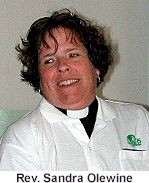| This
is the second article of two focusing on the Middle East conflict. If
you or a member of your church has been personally touched by this
conflict, please e-mail your story to MWacht@flumc.org.
By Michael Wacht
LAKELAND — “If we really care about the
lives of Israeli and Palestinian children, we need to face some hard
things,” said the Rev. Sandra Olewine, a General Board of Global
Ministries (GBGM)
missionary serving in Jerusalem.
The ongoing conflict between Palestinians and
Israelis is worsening, according to Olewine, and many people in the
region believe relations between the two peoples are at a historic
worst. “To bridge that gap now is going to be a very difficult road
to maneuver,” she said.
Olewine is assigned to Catholic Relief Services
in Jerusalem, Israel/Palestine. Her responsibilities include
documentation, interpretation and writing on Middle East issues.
She said part of the gap between the two peoples
is a difference in perspective about the conflict. The Palestinians
are “exhausted and feel very beaten,” Olewine said.
A partial pullback of Israeli troops on April 23
allowed Palestinians to leave their homes for the first time in weeks.
“People for the first time today are able to get out and assess the
damage…and check on family members after 20-some days of basically
being locked in their houses,” Olewine said. “There’s
destruction everywhere. People are seeing their towns and cities in
rubble. They are feeling anxiety because they’re separated from
family members and don’t know what’s going on.”
Israelis also are not clear about the breadth
and depth of the conflict, according to Olewine. “On the Israeli
side, there’s a lot of confusion,” she said. “There’s so
little press in the West Bank that people don’t have a good idea of
what’s going on. They don’t know the depth of despair across the
Palestinian people. The Israeli government is positioning this as
defense from the suicide bombers. Many people believe it directly
relates to Israeli security.”
The Israeli occupation has left much of the
Palestinian infrastructure damaged or destroyed, she said. Streets and
water pipes have been damaged. Cars have been crushed. Schools and
hospitals have been ransacked and destroyed, and administrative and
public health records have been seized. “That doesn’t feel like
defense,” Olewine said.
She said it is dangerous for Christians to try
to put this conflict into a Biblical context. “If you want to come
at it from a Biblical perspective…a literal interpretation of the
covenant of the land, one has to read past the book of Joshua,” she
said. “Isaiah, Jeremiah, Ezekiel had something to say about how the
people lived in the land and how the Babylonian captivity came out of
the injustice and oppressing the ‘alien.’
“It’s [the land] not a gift. There’s
responsibility in that gift—a way one is to be a light to the
nations. Trying to see the Biblical Israel as identical to the modern
nation of Israel is dangerous.”
Olewine said Rabbi Arik Ascherman, an activist
with Rabbis for Human Rights, warns against the land becoming an idol
and “greater than a right relationship with God and neighbor.”
“If the land is that which drives you from God
and neighbor, then it’s an element of idolatry,” Olewine said.
 Olewine
said there are five things Christians can do to positively affect the
Israeli/Palestinian conflict. “First and foremost, pray,” she
said. “I believe the situation would be worse except for faithful
people praying…for a just solution.” Olewine
said there are five things Christians can do to positively affect the
Israeli/Palestinian conflict. “First and foremost, pray,” she
said. “I believe the situation would be worse except for faithful
people praying…for a just solution.”
She also encourages United Methodists to be
generous to the United Methodist Committee on Relief and GBGM Advance
Specials related to the region. “The humanitarian crisis in the West
Bank and Gaza is severe,” she said, adding the people need food,
water and medicine.
The third action Christians can take is “to
stretch themselves to understand the context and complexity of the
situation,” Olewine said, adding they should seek Israeli and
Palestinian sources of news and information.
She also asked Christians to be in conversation
with Muslims and Jews in their communities about the Middle East. “Don’t
be afraid to tackle this hard…emotional and complex region,”
Olewine said. “Be very mindful of true anti-Semitism, which is still
very present and real. Hear the cries of Christian brothers and
sisters who happen to be Palestinian, and trust their call for life
and justice.”
Olewine also said Christians should be in
communication with lawmakers about the Middle East. “As Christians,
we’re called to be engaged in the world,” she said. “We need to
be engaged with the political leadership and encourage them to look at
trying to be in mediation…having the good of both communities in
mind…and to work with the root cause of the violence, the occupation
of the West Bank and Gaza Strip.” |